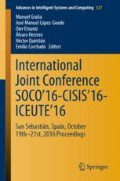Abstract
Most computational models of influence spread nowadays are motivated by the need to identify the social actors with maximal influence, in order to achieve high penetration in the market with minimal effort. However, there are little literature on the mechanisms of influence propagation, i.e. computational models of how the social actors change their opinions. There are some works that relate the spatial distribution of the opinions with the mechanism by which an agent changes or maintains its opinions, but they assume a cell model, where agents have fixed spatial locations and neighbors. Here we explore the effect of spatial interaction of the agents, which are free to move in a given space, following attraction dynamics towards agents with similar opinions. The spatial distribution of opinions observed by the agent is used by the agent to decide about opinion changes. We report preliminary results of simulations carried out in Netlogo environment for the first three kinds of systems.
References
Banisch, S., Lima, R., Araujo, T.: Agent based model and opinion dynamics as markov chains. Soc. Netw. 34, 549–561 (2012)
Crokidakis, N.: Effects of mass media on opinion spreading in the sznajd sociophysics model. Phys. A Stat. Mech. Appl. 391, 1729–1734 (2012)
Deffuant, G., Amblard, F., Weisbuch, G., Faure, T.: How can extremism prevail? A study based on the relative agreement interaction model. J. Artif. Soc. Soc. Simul. 5(2) (2002)
Gil, S., Zanette, D.H.: Coevolution of agent and networks: opinion spreading and community disconnection. Phys. Lett. A 356, 89–94 (2006)
Dreyer Jr., P.A., Roberts, F.S.: Irreversible k-threshold processes: graph-theorical threshold models of the spread of disease and of opinion. Discrete Appl. Math. 157, 1615–1627 (2008)
Jung, J., Bramson, A.: An agent - based model of indirect minority influence on social change. In: ALIFE 14 (2014)
Louie, M.A., Carley, K.M.: The role of dynamic-network multi-agent models of socio-political systems in policy. Technical report, CASOS (2007)
Mucchi-Faina, A., Paclilli, M.G., Pagliaro, S.: Minority influence, social change and social stability. Soc. Pers. Psychol. Compass 4, 1111–1123 (2010)
Rouly, O.C.: At the root of sociality: working towards emergent, permanent, social affines. In: Proceedings of The European Conference on Artificial Life, pp. 82–89 (2015)
Acknowledgments
Leire Ozaeta has been supported by a Predoctoral grant from the Basque Government.
Author information
Authors and Affiliations
Corresponding author
Editor information
Editors and Affiliations
Rights and permissions
Copyright information
© 2017 Springer International Publishing AG
About this paper
Cite this paper
Ozaeta, L., Graña, M. (2017). Agent-Based Spatial Dynamic Modeling of Opinion Propagation Exploring Delaying Conditions to Achieve Homogeneity. In: Graña, M., López-Guede, J.M., Etxaniz, O., Herrero, Á., Quintián, H., Corchado, E. (eds) International Joint Conference SOCO’16-CISIS’16-ICEUTE’16. SOCO CISIS ICEUTE 2016 2016 2016. Advances in Intelligent Systems and Computing, vol 527. Springer, Cham. https://doi.org/10.1007/978-3-319-47364-2_18
Download citation
DOI: https://doi.org/10.1007/978-3-319-47364-2_18
Published:
Publisher Name: Springer, Cham
Print ISBN: 978-3-319-47363-5
Online ISBN: 978-3-319-47364-2
eBook Packages: EngineeringEngineering (R0)

